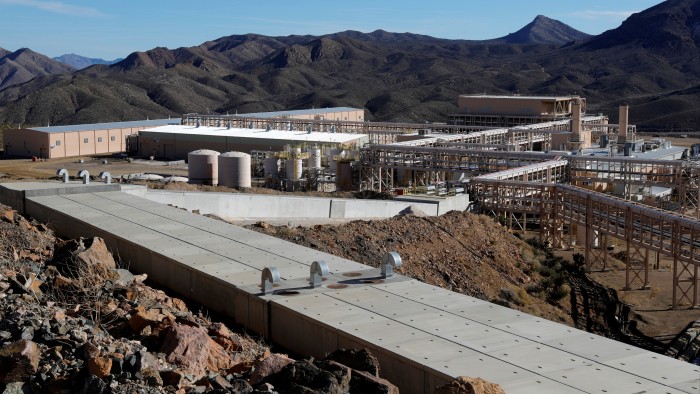James Litinsky made a $100mn bet in 2015 on the distressed debt of a flailing natural resources company.
His wager has now paid off spectacularly, after Donald Trump’s administration thrust the group to the centre of the US strategy to counter China’s dominance in critical minerals. Shares in Litinsky’s MP Materials surged 48 per cent last week after the Pentagon agreed to take a $400mn, 15 per cent equity stake in MP Materials and buy its output for 10 years at double the current market price. The rally handed Litinsky a $200mn boost to his personal wealth, and brought the group’s stock to a three-year high.
The unusual arrangement signals the Trump administration’s commitment to restoring domestic supply chains for 17 elements crucial to defence and national security technologies — and a new approach to bring business sensibility to the work of defending US interests.
“This appears to be pretty unique,” said Bill Greenwalt, former under-secretary of defence for industrial policy in the George W Bush administration. “Usually, the US government is reactive in making any investment in the private sector.”
The rare earth elements are critical to the manufacture of powerful magnets used in everything from missile guidance and satellite communications to stealth coating. They are essential for US weaponry, including the F-35 Lightning II fighter jet, unmanned Predator drones, nuclear submarines, Tomahawk missiles and bombing systems used by multiple branches of the armed forces. They also have applications in civilian technologies such as electric vehicles, wind turbines and smartphones.
The Pentagon did not respond to multiple requests for comment. Litinsky declined a request for an interview, and a company representative declined comment.

China accounts for 70 per cent of global production and 85 per cent of global processing of total rare earth oxides, according to Benchmark Minerals. And Beijing has repeatedly cut off rare earth supplies during periods of diplomatic tension with consumer nations, most recently in April. Both the Biden and Trump administrations have made reshoring rare earths a strategic priority.
Litinsky grew up in Florida, with four brothers who he says “taught him how to fight.” A ticket-scalping outfit in high school was among his early endeavours, according to a podcast he released in April. After graduating from Yale, he worked at Allen & Co and Fortress Investment Group before launching his Chicago-based hedge fund, JHL Capital Group, in 2006.
One bet involved shorting bank stocks during the financial crisis. But it was the plunge in energy prices in 2014 that sent Litinsky looking “for babies in the bathwater”, which led him to natural resources group Molycorp and Mountain Pass, its mine at the remote eastern edge of the Southern California desert.
Mountain Pass was the world’s largest producer of rare earths in the 1970s and 80s. But intense competition from China drove down prices so much that it became economically unviable. Mountain Pass stopped production in 2002. After changing hands, Molycorp went public in an IPO in 2010, but filed for bankruptcy five years later.
Litinsky had invested $100mn in Molycorp’s debt. Its Chapter 11 filing kicked off a contentious bankruptcy proceeding, with creditors trying to send the mine to reclamation.
Litinsky said he foresaw that the rise of Tesla and the growing number of electric vehicles on the road made rare earths mining a wise bet, and ultimately won control of the mine. MP Materials was founded in 2017 to acquire the mine and restart operations.

“It was like, congratulations, you’ve won a busted mine,” he said in a 2022 interview. “But we always believed in the long-term secular theme around electrification and its importance to national security.”
MP Materials became a publicly traded company in late 2020, as part of a Spac deal with Fortress Value Acquisition Corporation, which raised $545mn. A $45mn grant from the Pentagon helped restart the mine, on top of more than $1bn of private capital.
The company’s share price lost more than 70 per cent of its value from 2021 to 2024 as China pushed more supply on to the market and commodity prices plummeted.
But in the background, Litinsky was looking to Washington. After going public, the company accelerated its political spending, which reached $750,000 in 2024, according to data from Open Secrets, a Washington non-profit that tracks the flow of money in politics.
MP Materials “has been working on this for years behind the scenes”, said Drew Horn, chief executive of GreenMet Advisory. “This is the culmination of ideas and planning going back to before the Trump campaign won the election.”

The company was rattled in April by China’s retaliatory 125 per cent tariffs on US products, which prevented it from sending its rare earth ores there.
The deal with MP Materials will not solve the US rare earths problem entirely. The geology of the mine means that its main output is light rare earths, and less of the heavy rare earths that are essential for permanent magnets. It may have to import some ores containing heavy rare earths, such as dysprosium and terbium, according to Gareth Hatch, principal consultant at the Strategic Metals Advisory Council.
Despite the drawbacks, many say the deal has already transformed the way American mining companies think about working with the government.
The Pentagon’s investment “sends a pretty strong signal that the government is willing to . . . take a step beyond just typical protection” for industries and materials critical to national security and defence, said Laura Taylor-Kale, former assistant secretary of defence for industrial policy during the Biden administration.
“There’s always been these types of interventions, but they’ve been a little below the radar,” said Todd Tucker, director of industrial policy and trade at the Roosevelt Institute think-tank. “I think what’s different is that they’re being so explicit about it.”
Additional reporting by Amelia Pollard and Camilla Hodgson
https://www.ft.com/content/79b1693a-0788-4dc6-b431-027695534c62


